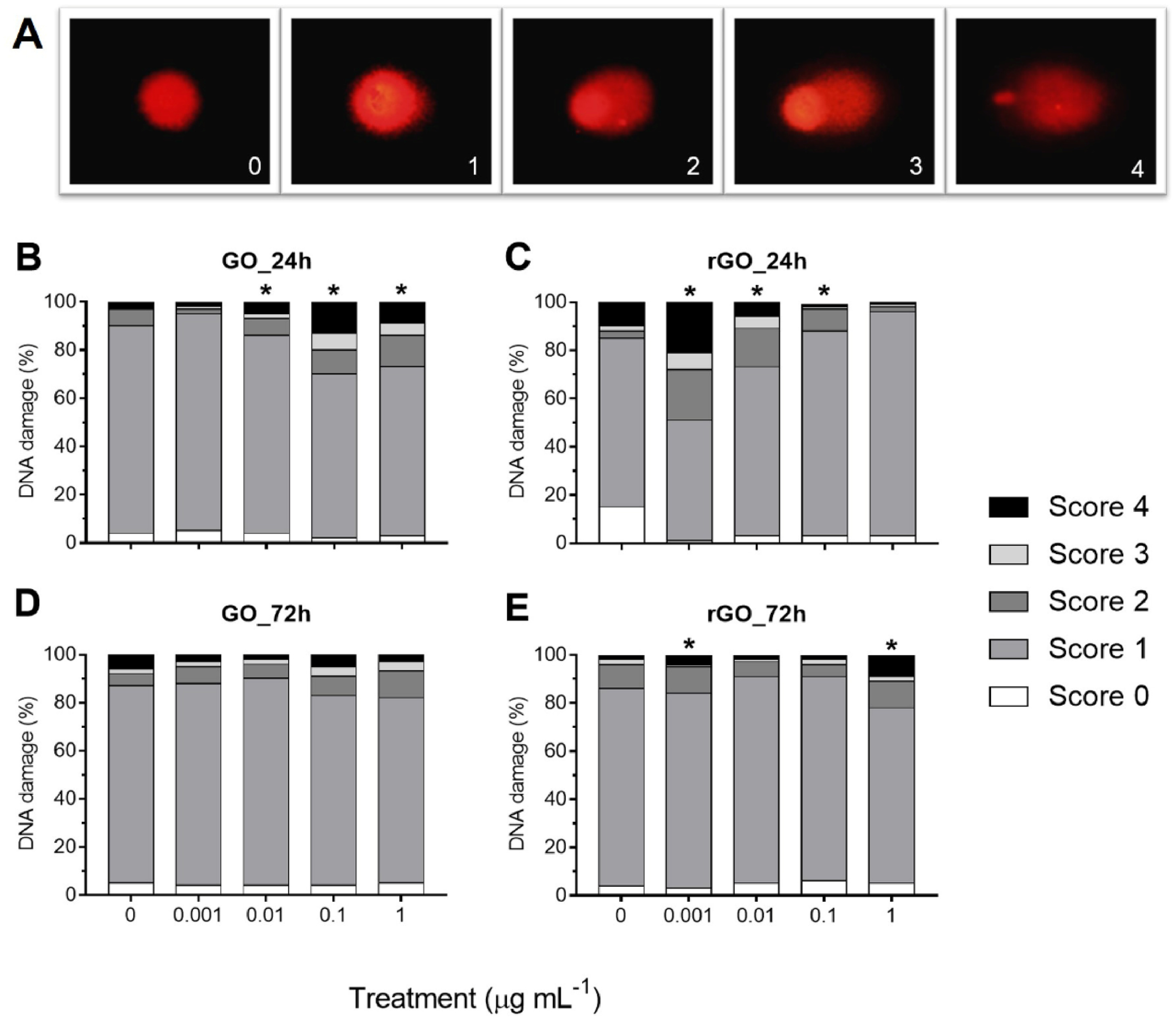rGO outperforms GO in generating oxidative stress and DNA strand breaks in zebrafish liver cells.
SIQUEIRA, Priscila Rodrigues de; SOUZA, Jaqueline Pérola de; VENTURINI, Francine Perri; CARMO, Talita Laurie Lustosa do; AZEVEDO, Vinícius Cavicchioli; ESTEVÃO, Bianca Martins; BONOMO, Marina Marques; SANTOS, Fabrício Aparecido dos; ZUCOLOTTO, Valtencir; FERNANDES, Marisa Narciso.
SIQUEIRA, Priscila Rodrigues de; SOUZA, Jaqueline Pérola de; VENTURINI, Francine Perri; CARMO, Talita Laurie Lustosa do; AZEVEDO, Vinícius Cavicchioli; ESTEVÃO, Bianca Martins; BONOMO, Marina Marques; SANTOS, Fabrício Aparecido dos; ZUCOLOTTO, Valtencir; FERNANDES, Marisa Narciso.





 Abstract: Graphene oxide (GO) and reduced graphene oxide (rGO) are both widely applicable and there is a massive production throughout the world which imply in inevitable contamination in the aquatic environment by their wastes. Nevertheless, information about their interaction at the cellular level in fish is still scarce. We investigated the metabolic activity, reactive oxygen species (ROS) production, responses of antioxidant defenses, and total antioxidant capacity (TAC) as well as oxidative stress and DNA integrity in zebrafish liver cells (ZFL) exposed to (0.001, 0.01, 0.1 and 1 µg mL-1) of GO and rGO after two exposure period (24 and 72 h). Higher ROS production and no significant changes in the antioxidant defenses resulted in lipid peroxidation in cells exposed to rGO. Cells exposed to GO increased the activity of antioxidant defenses sustaining the TAC and avoiding lipid peroxidation. Comet assay showed that both, GO and rGO, caused DNA strand breaks after 24 h of exposure; however, only rGO caused DNA damage after 72 h of exposure. The exposure to rGO was significantly more harmful to ZFL cells than GO, even at very low concentrations. The cells showed a high capacity to neutralize ROS induced by GO preventing genotoxic effects and metabolic activity, thus sustaining cell viability. The time of exposure had different impacts for both nanomaterials, GO caused more changes in 24 h showing recovery after 72 h, while cells exposed to rGO were jeopardized at both exposure times. These results indicate that the reduction of GO by removal of the oxygen functional groups (rGO) increased toxicity leading to adverse effects in the cells, even at very low concentrations.
Abstract: Graphene oxide (GO) and reduced graphene oxide (rGO) are both widely applicable and there is a massive production throughout the world which imply in inevitable contamination in the aquatic environment by their wastes. Nevertheless, information about their interaction at the cellular level in fish is still scarce. We investigated the metabolic activity, reactive oxygen species (ROS) production, responses of antioxidant defenses, and total antioxidant capacity (TAC) as well as oxidative stress and DNA integrity in zebrafish liver cells (ZFL) exposed to (0.001, 0.01, 0.1 and 1 µg mL-1) of GO and rGO after two exposure period (24 and 72 h). Higher ROS production and no significant changes in the antioxidant defenses resulted in lipid peroxidation in cells exposed to rGO. Cells exposed to GO increased the activity of antioxidant defenses sustaining the TAC and avoiding lipid peroxidation. Comet assay showed that both, GO and rGO, caused DNA strand breaks after 24 h of exposure; however, only rGO caused DNA damage after 72 h of exposure. The exposure to rGO was significantly more harmful to ZFL cells than GO, even at very low concentrations. The cells showed a high capacity to neutralize ROS induced by GO preventing genotoxic effects and metabolic activity, thus sustaining cell viability. The time of exposure had different impacts for both nanomaterials, GO caused more changes in 24 h showing recovery after 72 h, while cells exposed to rGO were jeopardized at both exposure times. These results indicate that the reduction of GO by removal of the oxygen functional groups (rGO) increased toxicity leading to adverse effects in the cells, even at very low concentrations. @article={003157021,author = {SIQUEIRA, Priscila Rodrigues de; SOUZA, Jaqueline Pérola de; VENTURINI, Francine Perri; CARMO, Talita Laurie Lustosa do; AZEVEDO, Vinícius Cavicchioli; ESTEVÃO, Bianca Martins; BONOMO, Marina Marques; SANTOS, Fabrício Aparecido dos; ZUCOLOTTO, Valtencir; FERNANDES, Marisa Narciso.},title={rGO outperforms GO in generating oxidative stress and DNA strand breaks in zebrafish liver cells},journal={Aquatic Toxicology},note={v. 262, p. 106640-1-106640-10},year={2023}}
@article={003157021,author = {SIQUEIRA, Priscila Rodrigues de; SOUZA, Jaqueline Pérola de; VENTURINI, Francine Perri; CARMO, Talita Laurie Lustosa do; AZEVEDO, Vinícius Cavicchioli; ESTEVÃO, Bianca Martins; BONOMO, Marina Marques; SANTOS, Fabrício Aparecido dos; ZUCOLOTTO, Valtencir; FERNANDES, Marisa Narciso.},title={rGO outperforms GO in generating oxidative stress and DNA strand breaks in zebrafish liver cells},journal={Aquatic Toxicology},note={v. 262, p. 106640-1-106640-10},year={2023}}